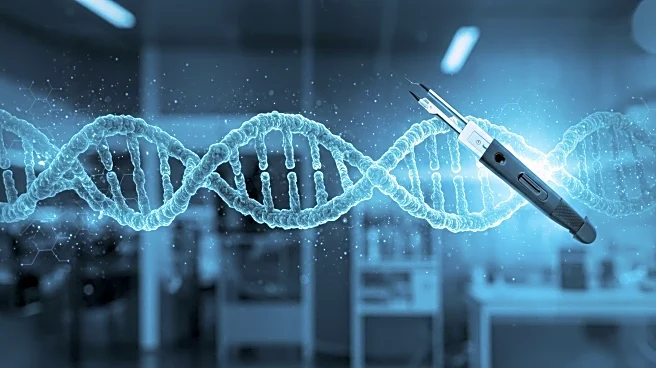What's Happening?
Researchers at the University of Zurich have developed AI-designed DNA repair templates that significantly improve the precision of gene editing. The study, published in Nature Biotechnology, highlights the use of an AI tool named 'Pythia' to predict how cells repair DNA after being cut by CRISPR/Cas9 technology. This advancement allows for more accurate modeling of human diseases and the development of next-generation gene therapies. The AI-designed templates were tested in human embryonic kidney cells, demonstrating precise integrations at 32 loci. Further validation was conducted in other organisms, including Xenopus frogs and living mice, where successful DNA editing in brain cells was achieved. The AI model simulates millions of possible editing outcomes, predicting the most efficient way to make specific genetic changes.
Why It's Important?
The development of AI-designed DNA repair templates marks a significant advancement in biotechnology and gene therapy. By enhancing the precision of gene editing, this technology addresses the challenge of genetic errors that can occur during DNA repair processes. The ability to predict and control these processes opens new possibilities for treating genetic diseases and developing targeted therapies. This innovation could lead to safer and more reliable gene editing techniques, benefiting medical research and potentially improving patient outcomes. The integration of AI in gene editing also highlights the growing role of technology in advancing healthcare solutions.
What's Next?
The successful application of AI-designed DNA repair templates in various organisms suggests potential for broader use in clinical settings. Researchers may continue to refine the technology, exploring its application in different tissues and disease models. The integration of AI in gene editing could lead to new therapeutic approaches, particularly in areas where precise genetic modifications are crucial. As the technology advances, regulatory bodies may need to establish guidelines to ensure safe and ethical use in medical treatments. Collaboration between AI developers and biologists will be essential to further enhance the predictive capabilities and practical applications of this technology.
Beyond the Headlines
The use of AI in gene editing raises important ethical and legal considerations. As the technology becomes more precise, questions about the potential for misuse or unintended consequences may arise. Ensuring that AI-driven gene editing is used responsibly and ethically will be crucial. Additionally, the long-term implications of widespread gene editing, such as its impact on genetic diversity and ecosystem balance, warrant careful examination. The collaboration between AI and biological sciences represents a transformative shift in research methodologies, potentially leading to breakthroughs in understanding complex biological systems.








